Double Trouble in the La Salle Hallways
Twenty-two Lasallians share the pros and cons of being a twin, and reflect on how it has affected them as individuals.
May 31, 2023
Some students at La Salle have to share some things with their siblings, but for La Salle’s 11 sets of twins, this is all they do with their siblings. From birthdays to friends to clothes to grade level, and even sometimes class schedules, twins have a lot of overlap in their lives. While these students are often grouped together, each one has their individual personalities and interests.
Breslin and Eldon Nichols:
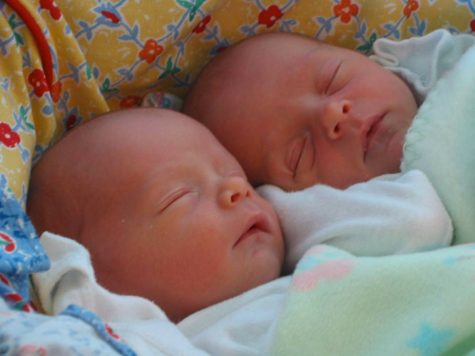
Juniors Breslin and Eldon Nichols are identical twins, born on Apr. 23, 2006. They grew up in Portland with three older siblings, ages twenty-four, twenty, and eighteen, and one younger sibling that’s fourteen.
Eldon, born four minutes before his twin brother, was named after his great-grandma. “My dad’s grandma’s name was Ellen, and he loved her with all his heart, so he wanted to choose a name that sounded similar to Ellen,” Eldon said. Breslin’s name was his mother’s maiden name.
Born identical to one another, it was difficult for people to differentiate between Breslin and Eldon. “They couldn’t tell us apart at birth either, our parents, our own parents,” Eldon said. “They had to paint [Breslin’s] nails blue, and just keep mine regular.”
“Also while we were growing up sometimes they would draw a blue ‘B’ on my forehead,” Breslin added.
Continuing throughout their lives, people still have a hard time knowing which Nichols twin is which. Both Breslin and Eldon expressed the irritation of being called the other one’s name, “people mix the name[s] Eldon and Breslin, which was almost everyone when they couldn’t tell us apart, so they would just call us ‘Breldon,’” Eldon said. “It’s a very interesting thing that people called us, still now, [but] mostly in grade school.”
Being siblings of the same age made comparisons for Breslin and Eldon difficult to deal with throughout their lives, “I think one of the obvious ones that people maybe don’t [realize] they actually do is grouping us as one person, and thinking that we are the same person,” Breslin said. “It can get a little bit frustrating, but we are not the same person, we do share some things, a lot of things, but we also do a lot of things differently; we’re different people.”
Growing up, they were often compared to one another in various different settings by their family members as well. “It hurts sometimes when my parents and even our siblings try to compare [us to] each other,” Eldon said. “We’re not the same person, and it’s just hurtful when they try to compare us like that.”
“Yeah, this is one of the hardships that I faced as a child, and I still face today,” Breslin added. “Just having Eldon always be the bar that is set, cause he’s pretty smart, he’s athletic, so I always have to try to stay up with him because I feel like I have to.”
Both Breslin and Eldon have played soccer for about ten years and now play soccer for Portland City United and earlier in the school year played varsity soccer for La Salle. “Our main sport is soccer, so I know if I pass the ball to Eldon he won’t lose it, he will get it back to me, or do something better with it,” Breslin said. “It’s just relieving having that one person on the field with you that you can get the ball to if you need.”
Being identical made their earlier years of playing soccer more difficult for them on the field. “Our soccer coach when we were younger gave up on trying to tell us apart, so he just called us each by our last name,” Breslin said.
Although soccer is their main sport, they began playing tennis seriously about four years ago and were doubles partners on La Salle’s varsity team this spring. “I have more trust with Breslin rather than anyone else on the court, so I think we play well together,” Eldon said.
“And when he makes a mistake, it’s a lot easier to yell at him and to correct him for that,” Breslin added.
Despite them having some similar passions, Brelsin and Eldon still have different interests they participate in separately.
Breslin began swimming around fourth grade but decided to pick it back up this year, and join the La Salle swim team.
Along with swimming, Breslin also began actively committing to snowboarding a couple of years ago, despite both Brelsin and Eldon beginning snowboarding and skiing lessons around eight years old.
“I took my first lessons, and then I went up maybe once or twice a year,” Breslin said. “Up until two years ago where I actually went up a lot during the year and got a season pass.”
Eldon explained that although he does ski, and started about the time Breslin started snowboarding he believes it’s “kind of a hassle to get up to the mountain, spend half your time on the ski lift, and stuff like that. So I do ski, but not as much as Breslin snowboards.”
In addition, at the end of November, Eldon began working at Double Mountain, “a pizza restaurant and a brewery in southeast Portland,” Eldon said.
Throughout the years, Breslin and Eldon have experienced many different comparisons and assumptions about being twins, especially since they’re identical. Despite this, both Breslin and Eldon enjoy being a twin.
“I think there are a lot of cons of being a twin,” Eldon said. “But at the same time I think being a twin is just such a unique experience, that I think being a twin is something that I’m thankful for, and I’m ,glad I am a twin.”
“There’s lots of different learning experiences that people who aren’t a twin don’t get,” Breslin added. “So I think that is one of the big benefits. I think as we grow older and maybe start to separate from each other, and maybe move off into our own lives, that we will still have that person that I can just talk to and that I can always trust.”
Ashley and Haley Hawkins:
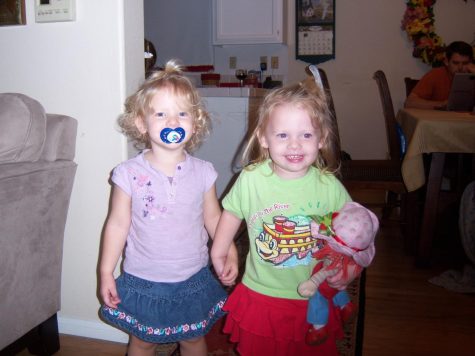
(Photo courtesy of Haley Hawkins)
“Oh yeah, I like being a twin,” and “It is the best gift ever,” is how seniors Haley and Ashley Hawkins express their feelings about being twins.
Ashley and Haley are fraternal twins both born on Sep. 6, 2004. Ashley is the older of the two by three minutes, she was born at 11: 53 pm, almost causing Haley to be born the following day.
Being twins has made Ashley and Haley very close, “I have a built-in best friend,” Ashley said. “When we do things together I am never alone, but we can also acknowledge that we can split up and be okay.”
“She is also the one person I could tell a secret to, and know it wouldn’t get out,” Ashley said.
Going through the same experiences at the same time has made them appreciate having one another during the different stages of their lives.
Ashley and Haley went to St. John the Baptist, a smaller Catholic K-8 school, so they had always stuck together and coming into La Salle was the first time they’d ever changed schools together. “Obviously it was really nerve-wracking for us,” Haley said. “But one thing that was really comforting was knowing that your twin’s right there next to you, and they’re also walking in their first day of school.”
During her time at La Salle, Haley has noticed that other sets of twins have different friend groups, “but we’ve never really been like that, we’ve always just been so close,” she said.
Despite going to the same schools their entire educational career, Ashley and Haley plan to go in separate directions for college. “Considering that the first time we spent more than 24 hours apart was [last] May,” Haley said. “I feel like we’re pretty good at being independent from each other, and I feel like college is going to be a change for everyone.”
“I think we’ve reached a point in our lives where we’re okay to be away from each other,” Ashley added.
“It’s not like we’re going to miss each other so much that we can’t function,” Haley continued.
Even though Ashley and Haley enjoy being twins, they’ve had some challenges regarding this throughout the years.
Being fraternal twins has sparked some people to make comparisons between the two based on their physical appearances. One of the most obvious differences between them is that Haley is 5′ 8″, whereas Ashley is 5′ 4″.
In addition, they have found it difficult to have individuality because of how people treat them, “something that really annoys me,” Haley said. “Is that everyone, especially my family, refers to us as ‘the girls,’ or ‘the twins,’ or ‘them.’ It just feels like you’re not your own person sometimes, and you’re always going to be grouped with the other person.”
Ashley explained that twins are “two different people, with different interests, different personalities,” she said. “Some things are going to be similar, but don’t compare.”
Constantly being grouped together was something both Ashley and Haley noticed growing up, especially when their older sister Emily didn’t experience it to the same extent.
“Growing up having an older sister, grandparents, aunts, and uncles would give her a hundred bucks, or she’d get a full trip by herself, [but] we always had to share everything,” Ashley said.
Although siblings can get compared a lot as well, Ashley feels that being a twin amplifies the comparisons. “We’re basically just siblings, but going through the same things in life at the same time,” she said.
“Siblings can be as close as we are to each other,” Haley added “They just happen to not be born on the same day.”
Ashley and Haley enjoy being around each other and enjoy doing some of the same things, but they also want to be their own person. “As a twin the most validation you could ever get is getting something your twin doesn’t,” Haley said. “Not in a bad way, but if I got an award for something and she didn’t, I’m not happy that I got the award, I’m just happy that independence is shown.”
Regardless of the few difficulties Ashley and Haley have experienced growing up as twins, overall they enjoy being the same age and having each other through the different aspects and experiences of their lives.
“I would say having a twin is like going home with your best friend every day,” Ashley said.
Jackson and Jillian Craeton Raddle:
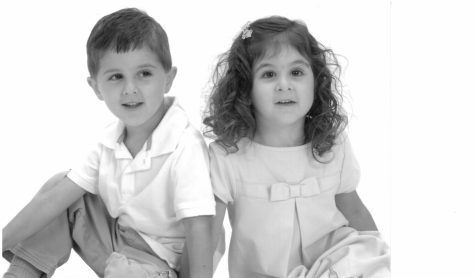
Being fraternal twins that are not the same gender makes it difficult for people to realize sophomores Jackson and Jillian Craeton Raddle are twins without either of them saying something.
Jackson and Jillian, born Feb. 17, 2007, are the youngest of their three siblings. Their two step-sisters are two and five years older, and their biological brother is six years older, making Jackson the youngest of all four siblings including his twin who is two minutes older than him.
When their parents were deciding on names for Jackson and Jillian they were deciding between their names now, and ‘Luke’ and ‘Leia,’ in reference to the siblings in Star Wars. “Our parents were like ‘if we’re going to have twins we might as well go big or go home,’” Jackson said.
In the end, they decided to choose the names ‘Jackson’ and ‘Jillian’ in reference to the ‘Jack and Jill’ nursery rhyme. Their parents wanted them to be able to go by something slightly different if they decided to, which is why they named them the extended versions ‘Jackson’ and ‘Jillian.’
As they got older, they started to prefer to go by “Jackson” and “Jillian” because that way less people realized the nursery rhyme reference, but their parents still call them by ‘Jack’ and ‘Jill.”
Growing up, Jackson and Jillian disliked being compared, so to avoid it, they did what they could to be as different as possible from one another. “I feel like most twins would want to dress up if there was a spirit week, and it was twin day,” Jillian said. “We did not want to do that; we were absolutely opposed to anything [like that].”
The comparisons also began to affect their relationship as siblings, “We just fought a lot,” Jillian said. “We were always battling against each other to try to be different than the other one.”
In addition to the comparisons, both Jackson and Jillian struggle with never really having their own space. “We’re just so close too, that we’re always in each other’s business,” Jackson said. “It just gets annoying sometimes.”
Jillian expressed that the most annoying thing for her was that she doesn’t receive “that much personal space, ever,” she said.
Even with the lack of alone time they both receive, Jillian believes “[being a twin is] better than being an only child because you always have someone there for you.”
There have been times when being twins has been convenient for Jackson and Jillian. Before coming to La Salle they went to St. Therese for elementary school and Happy Valley Middle School.
“When we transferred from Saint Therese to Happy Valley Middle. It was a really big change because of the size of the school,” Jillian explained. Since they didn’t know anyone going into middle school, having each other made it less overwhelming.
Now in their second year of high school, they’re more independent. Jillian continues to play soccer for her eighth year, whereas Jackson, who used to play soccer, decided to switch to football four years ago.
Despite their separate interests, they both joined the track team when they started high school.
Even though both have slightly different friend groups at school and have a few different interests, they have still stayed close to each other. “I think we started to separate as we’ve gotten more independent, growing up, but I think we’re still pretty close,” Jackson said.
Regardless of the negatives that come with being twins, “at the end of the day the pros of being a twin outweigh the cons,” Jillian said. “We do fight a lot, there’s always something to fight about, but I think if we were a year apart then it would be even more annoying because we’re still so close, but there’s this slight age difference.”
Sofia and Natalie Gonzalez:
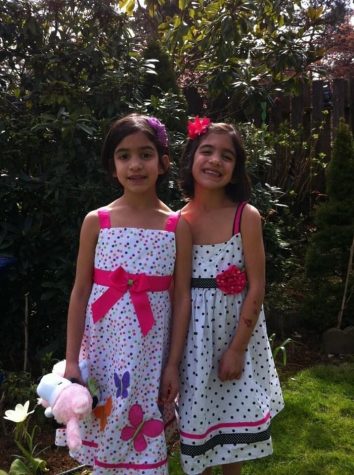
Born in Portland, on Mar. 26, 2006, juniors Natalie and Sofia Gonzalez believe being identical twins isn’t as glamorous as it seems. “I feel like it’s not very interesting being a twin,” Natalie said.
“It’s not as fun as some stuff portrays it to be,” Sofia added.
Despite Natalie and Sofia being identical twins, people can typically tell them apart after getting to know them for a little while. “When we first meet people it usually takes time,” Sofia said. “But I would say some people can usually tell the difference between us, other times it takes a really long time especially if they’re not around us as long.”
Natalie added that “there’s some people who just can’t tell us apart, but the majority I feel like they can.”
For teachers, Sofia believes it’s harder for them to distinguish between her and Natalie since they have them in different classes and don’t see them as much. “So they kind of just go off of who’s in each class,” she said.
Since Natalie and Sofia participate in some different sports, there are times when people don’t realize they’re twins. “When we were sophomores,” Sofia said “She does swim and I don’t, and sometimes some of her teammates would wave at me and I just wouldn’t know who they were. I think some people didn’t actually know that we were separate people because they only met one of us.”
Sofia explained that people use a few identifiers to differentiate between her and Natalie. They have different face shapes, talk differently, Natalie is an inch taller, and Sofia has a scar above one of her eyebrows.
Sofia had to get stitches for the scar she received when she was younger, still making it slightly visible now. Sofia explained, “it was in preschool, it was nap time, and I was returning a book to the little cupboard, and the lights were off, and I fell over something and cut my head on [the] cupboard.”
Regardless of if most people can tell them apart, Sofia wishes they weren’t identical twins. “Sometimes it feels like people just see us as one person instead of separate, and I feel like they just expect us to be really similar, like the exact same,” she said.
Sofia also finds it irritating when people refuse to make an effort to tell her and Natalie apart.
On the other hand, Natalie isn’t bothered too much by being identical. “For the most part it’s fine, I can wear her clothes because we’re the same size, so I can borrow her stuff and I can unlock her phone with my face,” she said.
Other than a few positives, Sofia and Natalie don’t find that there are many benefits to being twins and would rather be siblings at least a year apart.
“It’s sort of cool [being a twin], but I feel like it would be nice to not have someone in the same grade as you and [who] does all the same things,” Natalie said.
“It would just be nice to not be tied with the other person,” Sofia said. “I enjoy having siblings, but it’d be nice to have a little more individuality.”
Having a younger brother makes it more apparent that they’re oftentimes treated differently because they’re twins. “When we were growing up, I feel like we always had to share,” Natalie said. “We didn’t get as [many] little things, but there’s one of him, so he doesn’t have to share with anyone.”
While growing up, Natalie and Sofia would receive books, but would only get one copy of each book which they were supposed to share. This oftentimes led one of them to spoil the book for the other. “Even now,” Sofia said. “For TV shows or stuff like that, we usually end up spoiling something because one of us just wants to tell the other.”
Starting when they were in kindergarten, Natalie and Sofia began playing soccer, and have continued playing since, this year marking their third year playing for the girls La Salle soccer team.
Sofia explained that although people can usually tell them apart, when they’re on the soccer field, it can be a lot more challenging. “We wear our hair really similarly,” Sofia said. “Especially if you’re watching from the stands, it’s really hard just because you’re watching from a distance.”
Aside from soccer, Sofia and Natalie have a few different interests. After the soccer season has ended Natalie swims for the La Salle swim team, and in the spring does track. Sofia does tennis in the spring, and outside of school works at Great Harvest, a position which she started this fall.
Having different activities makes it difficult for Sofia and Natalie to figure out a schedule for their car. “It’s sort of annoying,” Natalie said. “Because she has long shifts, so she gets the car all day when she works the weekends.”
“But then it also makes up for it because she gets [the car] when she has swim,” Sofia added.
Natalie said that “having another person around all the time,” is one of the more annoying things about being a twin. “People assume you’re going to want to be together all the time,” Sofia said. “But I don’t always want to be around her.”
At school, despite not always wanting each other’s company, they have the same friend group making it difficult for them to have a break from one another at school.
When looking into the future Natalie and Sofia don’t plan on going to the same college. “I wouldn’t base my decision off where she [goes],” Sofia said. “I would prefer not, just so I can see what it’s like because we’re not gonna always be together, but if we both like the same college, I’m not going to change my plan just because she’s going there.”
Raphael and Gabriel de Leon:
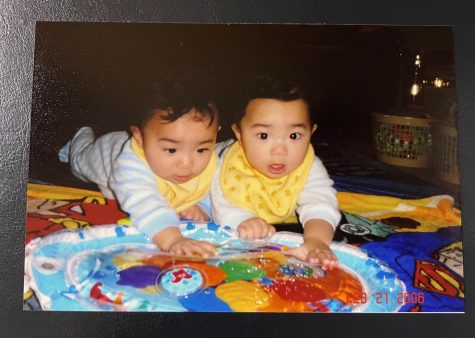
Regardless of what many people believe when they first meet seniors Raphael and Gabriel de Leon, they are not identical twins. “A lot of people are surprised when they find out we’re fraternal, and some of them think we’re lying,” Raphael said.
Born on June 25, 2005, Raphael and Gabriel’s names were chosen by their parents after they found out they were having twins. They wanted their names to be connected, which is why they chose “Raphael” and “Gabriel,” after the archangels.
Raphael and Gabriel don’t have any other siblings, but from what they’ve experienced they’d prefer being twins over being a year or two apart. “You have equal responsibility,” Gabriel said. “You both take part, and I’m not bossing him around, [and] he’s not being the annoying younger brother.”
Raphael added, “I don’t really know what it’s like to not have a twin, so I just think it’s normal, it’s just my brother.”
They both explained that being a twin is easier because they’re able to experience the same things at the same time, and they’re closer because of it.
Despite enjoying being twins, growing up there were some negatives that came with it. It was annoying for Raphael and Gabriel when people couldn’t tell them apart, but as they grew older they got used to it, and accepted that it was one of the factors to being a twin.
Raphael explained that sometimes, specifically freshman year, Gabriel’s friends would greet Raphael thinking he was his brother. “I’ll just say ‘hi’ back because it’s less awkward to pretend to be Gabriel rather than to be like ‘no, I’m Raphael,’” he said.
Continuing through high school, they also began to realize that they were often going to be compared to one another. “If one of [us] is slightly better than the other in something, it’s going to get pointed out,” Gabriel said. “Not just between parents, but also with everyone else around [us].”
The comparisons make it difficult since Raphael and Gabriel participate in a lot of the same things, both academically and athletically at school.
They both do cross country in the fall, swim in the winter, and track in the spring. With academics, Raphael and Gabriel take similar classes, causing them to have four to five classes together each year, which they mentioned made it easier to do homework.
Despite sharing a few similar activities, Raphael and Gabriel still have their separate interests. “I guess people think that twins are the exact same with personalities and likes,” Gabriel said, “and what they’re good at, what they’re bad at, just because they’re the same age and born at the same time. We’re completely different people.”
At the end of last year’s school year, Raphael was elected as the student body president for this year, and he is the co-president of the Asian American and Pacific Islander club.
Gabriel mentioned not really enjoying those types of leadership roles, but instead liking, “computer science, technology, and STEM mostly,” he said.
Next year, Gabriel plans to study computer science at Oregon State University, whereas Raphael wants to study psychology at the University of Oregon. When applying to colleges Raphael and Gabriel didn’t intend on going to rivaling schools, but the schools they chose lined up with what each of them wanted to study.
Gabbi and Catie Tassinari:
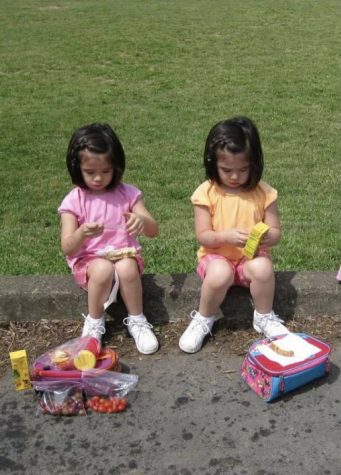
Born on Dec. 21, 2004, four minutes apart from one another, seniors Gabbi and Catie Tassinari are unsure if they’re identical or fraternal twins. “We were never tested when we were born,” Gabbi said. “It really depends who you ask, if we look more or less similar, but we aren’t 100% sure.”
Despite the uncertainty of being identical, many people, specifically when Gabbi and Catie were younger, would mix the two up. “Gabbi always wore a purple bow and I always wore a pink bow because our teachers, until second or third grade, could not distinguish us,” Catie said.
However, aside from the different colored bows, Gabbi and Catie would wear identical outfits most days. “Probably until like fourth grade,” Gabbi said. “We had all the exact same clothes … [When] our mom would go shopping, she’d just get two of the same outfit.”
“We’d always get the same thing,” Catie added. “It wasn’t personalized, we were treated like the same person a lot of the time.”
Being twins made the lack of variation in their everyday life difficult to express who they were apart from being a twin. People had assumed that “we were the same, like we had the same personality just because we look the same,” Gabbi said.
Entering high school gave them the opportunity to experience more individualism, “it was nice being able to branch out on your own, and kind of learn independence.” Gabbi said. Going to Holy Family, a smaller K-8 school, made this difficult for them. “We had all the same classes, all the same friends, all the same teachers, so it was almost like we were stuck doing the same thing. We couldn’t develop our own personalities.”
Although people don’t confuse Gabbi and Catie for each other as much as they did when they were younger, there are still a few exceptions. “In the past when we’ve had similar classes it’s easier because we’re next to each other,” Gabbi said. “But we’ve heard with teachers when we’re not in the same class, and then they see us in the hallways, they’re like ‘oh, I can’t tell which twin that is.’”
Despite the adversities they’ve experienced throughout their lives, Gabbi and Catie have appreciated some of the advantages that come with being twins. “I think, especially when I was younger, I liked [being a twin] because it was something unique that set me apart,” Catie said.
In addition, Gabbi and Catie were able to enjoy some of the myths other kids believed about twins. “A lot of people, mostly as a joke, but they asked about telepathy,” Gabbi said.
“That was a big thing in middle school,” Catie added. “We would egg them on and practice answers if they asked us stuff like ‘what number is she thinking of,’ and we’d both say 21 because we’d practice it at home to try to throw them off.”
Attending Holy Family for grade school meant that Gabbi and Catie had never had to transfer schools before La Salle, “the convenience of having someone with you all the time, especially going into high school, or going into a new place, you don’t have to be alone,” Gabbi said.
However, they will no longer be able to use this advantage as Gabbi and Catie look onto their next phases of life after high school, they plan to take different paths for college.
Flora and Leon Peruzzo:
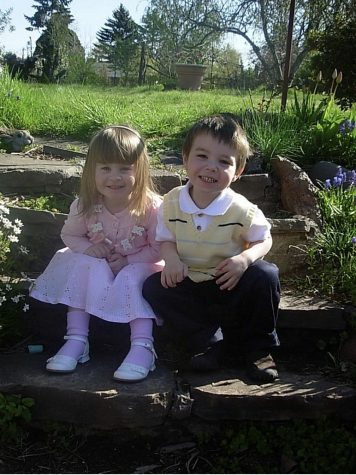
(Photo courtesy of Flora Peruzzo)
Juniors Flora and Leon Peruzzo don’t have a particular like or dislike towards being twins. “I don’t really have a problem being a twin,” Leon said. “I feel like being a twin, you’re the same age, and relate to the same stuff.”
Both Flora and Leon recognize the advantages and disadvantages to being twins, but believe that they aren’t treated far differently from siblings that are a year or two apart.
One of the more annoying factors of being so close in age that Leon has noticed are the small arguments, “we may argue over something really stupid, and then we’ll not talk to each other,” he said.
Despite this, growing up Flora and Leon were lucky, as he described it, because they were never compared to each other that much in either academic or in sports settings. Flora and Leon participate in different extracurriculars which limits the amount of comparisons the two receive.
Aside from both of them playing basketball for a short period when they were younger, “we’ve never specifically played the same sport,” Leon said.
Flora began cross-country for the first time this year, and did dance two years prior. Whereas Leon, is “not hugely into physical activity sports, not that I don’t want to do them, nothing really catches my eye,” he said. Instead, Leon does speech and debate for La Salle, which he has participated in since his sophomore year.
For academics, Flora and Leon have always gone to smaller schools, forcing them to have a lot of the same classes together. “Sometimes it’s nice, but at the same time,” Flora said. “It’s an excessive amount,” Leon continued.
Some of the misconceptions Leon has come to acknowledge is that “some people [think] it’s not fun to have a twin really, or you’re always clashing,” Leon said. “I don’t feel like we clash that much or argue.”
Flora and Leon share a birthday on July 21, and have almost always spent it together, aside from last year “because he was off at boys scout camp,” Flora said. “I did not like having it by myself, it was less fun.”
Typically, however, on their birthdays “we get our own opportunities like a day before our birthday to do our own thing,” Leon said.
“They’re similar to anyone else’s,” Flora added. “We just have two people celebrating. It’s kind of nice because I don’t like having that much attention.”
Overall Flora and Leon aren’t that affected by being twins. “I like it,” Flora said. “I feel like it makes me more of an interesting person.”
“Really isn’t that bad,” Leon added “You get your own time.”
Kat and Ian Marks:
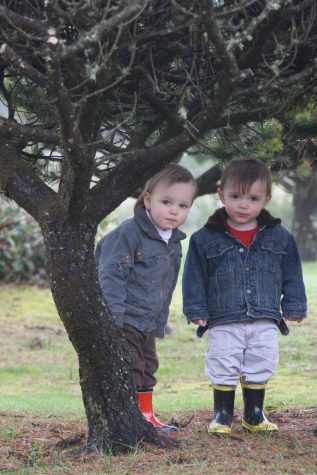
For ninth graders Kat and Ian Marks, being twins has caused them to spend a lot more time together than other siblings. Before coming to La Salle, they went to a K-8 called All Saints School where “our mom requested that we were put in the same class,” Ian said “So we’ve been next to each other for a long time.”
In their first year of high school, “we don’t see each other as much,” Kat said. “We have a bunch of different classes, so it’s a little bit different.”
In the past, having the same classes was beneficial for both Kat and Ian because it allowed them to easily receive help when needed. “If I don’t get something, I just go to him,” Kat said.
However, constantly being around each other causes them to become irritable with one another, “we get [in] a lot more arguments,” Ian said. “I think as a twin you’re less worried about saying things that would hurt their feelings…because with a friend you can stop being friends, but you can’t really stop being twins.”
In addition to the regular arguments, the other downside that Kat expressed was not having much to herself. “I feel like my biggest thing is I have to share everything with him,” she said.
Now that Kat and Ian have gotten older, “instead of just our parents getting two of everything,” Kat said. “I don’t have to share as much, [so] something that is for me, is clearly for me.”
Kat and Ian said that most of the comparisons they experienced growing up were being compared to their older brother. “I know we got sometimes compared to our brother because he [went] to the same school[s],” Ian said. “So sometimes with a teacher when they had him, they’d compare him to us.”
Typically however, they are not compared to each other since they participate in different interests, but also because oftentimes “people I don’t think can tell that we’re twins,” Kat said.
Both born on June 19, 2008, Kat and Ian were born about two minutes apart. Although they didn’t have many downsides to being twins, they still both agreed they’d prefer to be a year apart rather than the exact same age.
Niko and Stefan Spielvogel:
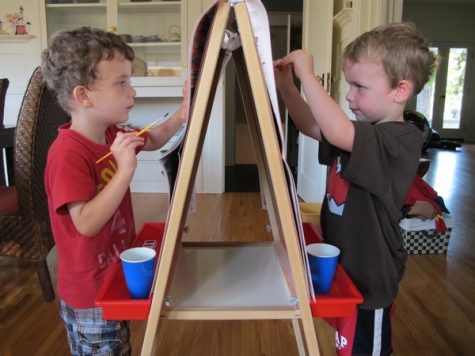
Sophomores Niko and Stefan Spielvogel are fraternal twins both born on July 9, 2007. Growing up and now, most people aren’t able to tell Niko and Stefan are twins, “they just don’t think we’re related,” Niko said. “We’ve never looked alike.”
Stefan explained that when people are able to see the resemblance between the two, it’s because they can see the similarities in their eyes.
Although they don’t hang out that often at school anymore due to the fact that they have developed different friend groups, they do have classes together which wasn’t the case for a while. “This year was the first year we’ve had a class together since preschool,” Niko explained. “We were just menaces.”
“Yeah, in preschool they found out pretty early that we shouldn’t be put in class together,” Stefan added.
One misconception that Niko has found to be untrue with his relationship with his brother is that “twins do absolutely everything together,” he said. “We are different people.”
However, this wasn’t always shown when they were younger, “we’d get the same color jackets as little kids,” Stefan said. “We [did] all the same stuff, we had pretty much identical interests, but then as we grew older Niko did other stuff.”
In addition, they know that myths about twin telepathy are inaccurate. “If you’re little kids and you do a lot of things together…and you have similar interests, you have a lot of shared experiences,” Stefan explained. “It has nothing to do with being twins, just coincidence.”
While growing up, something that annoyed both Niko and Stefan was that they had to split almost everything. This didn’t just include things like clothes, and gifts they received, but also smaller things “Like at a restaurant we’d [ask] ‘Oh, can we get a soda,’” Niko said. “‘Oh, split it,’” Stefan continued.
Despite this one downside, Niko and Stefan were thankful to have one another growing up because they were always able to have someone there. “A lot of kids are singletons, they get bored,” Stefan said.
“Having him as a twin, it’s kind of cool,” Niko added.
Lucas and Olivia Hungerford:
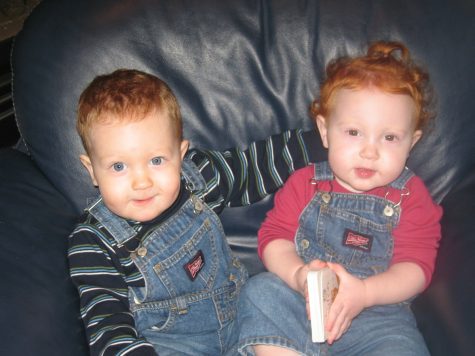
Juniors Lucas and Olivia Hungerford, both born on Nov. 23, 2005, are fraternal twins, which as Lucas explained, causes people to not realize they’re twins. “I think it’s kind of half and half,” he said. “Sometimes people immediately have known that we [are] twins and sometimes it’s taken them a little bit longer to put the pieces together.”
Although growing up both twins would share birthday parties together, as they have gotten older, that has changed. “For the first couple of years we always had parties together, but I think that since then it hasn’t been much different from people who don’t have a twin, we celebrate together, but then we have separate friends and parties,” Lucas said.
When entering high school, Lucas and Olivia found that being the same age is useful. “I think it’s nice having someone in the same grade as you,” Lucas said. “Living in the same house to talk about homework and classes especially since we’re in a lot of the same classes this year, and just to help each other on schoolwork especially.”
For Olivia, she holds comfort in knowing she always has someone to relate to. “We have mutual friends and we can talk about school and stuff like that,” she said.
When the COVID-19 pandemic occurred, Lucas found it convenient to have a twin because he had “someone that lives with you that’s starting high school at the same time, it was really helpful just because it was a big change,” he said.
Lucas and Olivia are often compared to one another “by teachers and sometimes even our parents,” Olivia said. “Academically we get compared a lot.” Both have different academic interests and strengths, Lucas is more into mathematics and science, whereas Olivia is more inclined to choose artistic pursuits such as art and English.
Their interests also differ outside of academics. “I like sports like basketball and soccer, and she likes [to] dance, so [it’s] a little bit different there,” Lucas said.
Along with being compared, people will also make assumptions about how they think Lucas and Olivia behave based on their twin. “In some cases in school we [get] compared to how each other’s doing in certain classes,” Lucas said. “And people who’ve met one of us, but not the other one tend to assume that our personalities are similar.”
Although Lucas and Olivia aren’t too annoyed with the comparisons they receive, they still notice when people don’t acknowledge their different personalities and interests. “Sometimes people who don’t know us very well, will give us both the same gift,” Lucas said. “Which is fine, but it’s just kind of funny, which goes back to people thinking we’re kind of the same person,”
Despite the constant confusion and misinterpretation on who the twins are individually, both Lucas and Olivia said they overall enjoy being twins.
Looking forward, the twins have a broad view of their plans after high school, and they don’t know where their academics will take them, but Lucas and Olivia wouldn’t mind attending the same college. “I think we might end up at the same [college], but not on purpose,” Lucas said. “Definitely not against going [to] different places.”
Layne and Sawyer Portash:
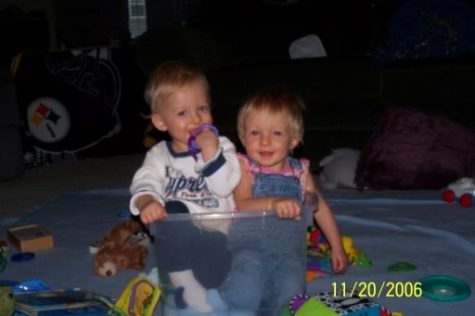
Layne and Sawyer Portash, both juniors at La Salle, are one of many twin pairs learning to navigate high school alongside their other half.
Both Layne and Sawyer are taking AP United States History and Religion together, which allows them to get help when they are working on the same assignments, but it does also pose a challenge at times when both students are in the same spot academically. “People always ask who has better grades,” Layne said.
Although their interests were more aligned in elementary school, each twin has adopted traits that make them stand out. While Sawyer likes driving, Layne said, “I don’t have a license…I just like not driving.”
While in middle school, attending Saint John the Apostle, the twins were often kept under careful watch by their teacher. “The teacher would always look at our work, Layne said.”[so] we couldn’t share our work.” Sawyer added that this was because “they tried to stop us from cheating.”
Layne states that not being in the same class is better. “Yeah, but we [still] take the same classes, so it’s chill,” Sawyer said.
While sharing classes can be beneficial, other aspects of their lives they do not enjoy sharing.“We have some of the same friends…so we’re always hanging out together,” Layne said. However, to Sawyer it doesn’t have as big of an impact on his life. “I don’t mind, I forget [I’m a twin],” he said.
While looking at plans for after college, both siblings seem to have a relaxed approach to how they would feel if they attend the same university. “I don’t think we’d plan around going to the same one,” Layne said. And Sawyer shared an even more go-with-the-flow response. “Just whatever happens,” he said.

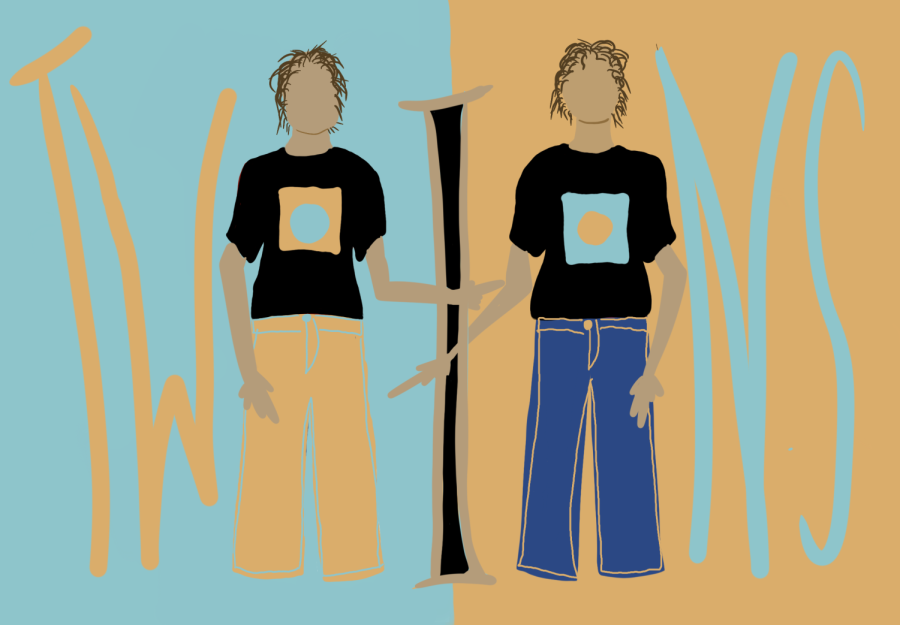
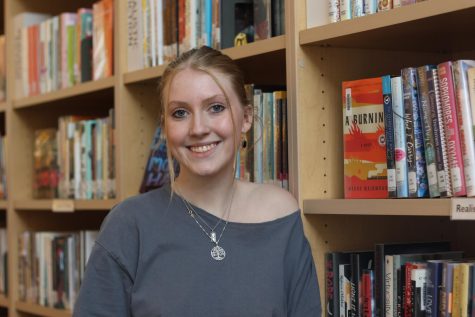



Christina Spielvogel • Jun 1, 2023 at 11:23 am
Great article!!